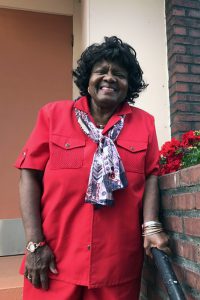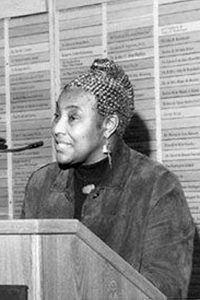We recognize a few of our Black alumni and their accomplishments. We are proud of their dedication and commitment to nursing. Read more about them below.
- Lela Duffel Morris BSN ‘48, the first black graduate of the School of Nursing, overcame persistent discrimination to champion public health issues over a fifty-year career. Morris began her health care career as a public health nurse in the District of Columbia. Morris initiated programs on behalf of minority workers experiencing occupational diseases that generated broader public health reforms. She founded the Department of Continuing Education at the Northern California Occupational Health Center. For our centennial in 2018, she was selected as one of the 100 Most Influential Nurses, with ties to UW, who have demonstrated an undaunted commitment to improving the lives of others.
- Viola Wesley BSN ’55, may have been the first black student nurse at Harborview.

- Muriel Softli BSN ‘61 nursing career has spanned continents, as a volunteer U.S. Air Force nurse and missionary, but her most meaningful impact was in the lives and health of local school children, as Seattle Public School nurse for 42 years. She retired seven years ago but came out of retirement to care for students as the school nurse at First Place School, a private nonprofit school for children experiencing trauma or homelessness. Softli was named a clinical preceptor of the year in 2017. “I let the nursing students have free reign of the school,” she said. “They got to know the faculty, the students and families. First Place School was a wonderful experience for them, and a great way to introduce them to this population.” As a school nurse, Softli and her UW students managed medications, dealt with students’ mental health needs, provided annual preventative care exams, participated in Student Intervention Team meetings and more. Despite the students’ difficult home situations, Softli and her UW students developed close bonds with the children at First Place School. For our centennial in 2018 she was selected as one of the 100 Most Influential Nurses, with ties to UW, who have demonstrated an undaunted commitment to improving the lives of others.

- Lois Price Spratlen BSN ‘76, Faculty 1983-2011 Ombudsman 1982-2009 was appointed the UW Ombudsman (a role meaning mediator and advocate) for Sexual Harassment in 1982 and was later appointed the University Ombudsman, the first woman in that role. She facilitated communication between the university and its students, faculty, staff, parents, alumni, and vendors. Spratlen argued that nurses were particularly well-suited to be mediators and introduced other nurses to similar roles. She also served as an ambassador for nurses of color in Seattle and in 2001, she wrote a book chronicling the careers of dozens of black nurses in Seattle. For our centennial in 2018 she was selected as one of the 100 Most Influential Nurses, with ties to UW, who have demonstrated an undaunted commitment to improving the lives of others. The Lois Price Spratlen Foundation was founded to honor the spirit and legacy of Lois Price Spratlen.
- Kennie Amaefule BSN ‘87 MSN ‘02 has revolutionized access to health care, education, and clean water in Imo, her home state in Nigeria. After immigrating to the United States, she founded Caring Hearts International, a nonprofit organization dedicated to improving health care and social services in Nigeria. Imo’s leaders recognized her significant humanitarian contributions to the region by naming her the state’s first female chief in 2002. Amaefule has done all of this while also working as Nurse Manager for Rehab Care at the Veteran’s Administration Hospital in Seattle. In 2018 she was selected as one of the 100 Most Influential Nurses, with ties to UW, who have demonstrated an undaunted commitment to improving the lives of others.
- Shanda Taylor Boyd, BSN ’94 entered the United States Army after college, then returned to school to complete her nursing degree at the UW. She returned to the military as an Army nurse. In 2004, she suffered a traumatic brain injury as a result of an automobile accident and learned that she could no longer work as a nurse. She has since dedicated herself to advocating for disabled veterans and military families through the R4 Alliance and other organizations. In 2018 she was selected as one of the 100 Most Influential Nurses, with ties to UW, who have demonstrated an undaunted commitment to improving the lives of others.